
Could Oumuamua be an alien spaceship? An interview with Harvard Astronomer Avi Loeb
Prof. Avi Loeb, Chair of Harvard Universitys Department of Astronomy is known to be the first academically distinguished figure to write a scientific paper claiming our solar system may be visited by an alien reconnaissance ship from another civilization. Prof . Loeb spared his valuable time for Salom newspaper and noted that in order to make advances in science, it is necessary for us to acknowledge Oumuamua as an uncertainty and accept there is a possibility that it might be an alien artifact. For me, Loeb who is not afraid to put his career and reputation on the line, is the long-lost hero who will save the subject of extra-terrestrial intelligence from the monopoly of science fiction.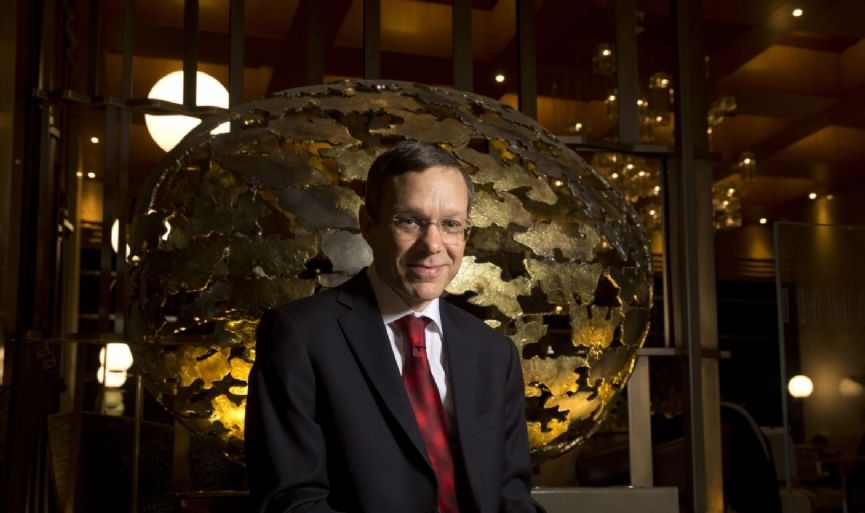
Prof. Avi Loeb, Chair of Harvard University’s Department of Astronomy is known to be the first academically distinguished figure to write a scientific paper claiming our Solar System may be visited by an alien reconnaissance ship from another civilization. Prof Loeb spared his valuable time for Salom newspaper and noted that in order to make advances in science, it is necessary for us to acknowledge Oumuamua as an uncertainty and accept there is a possibility that it might be an alien artifact. For me, Loeb who is not afraid to put his career and reputation on the line, is the long-lost hero who will save the subject of extra-terrestrial intelligence from the monopoly of science fiction.
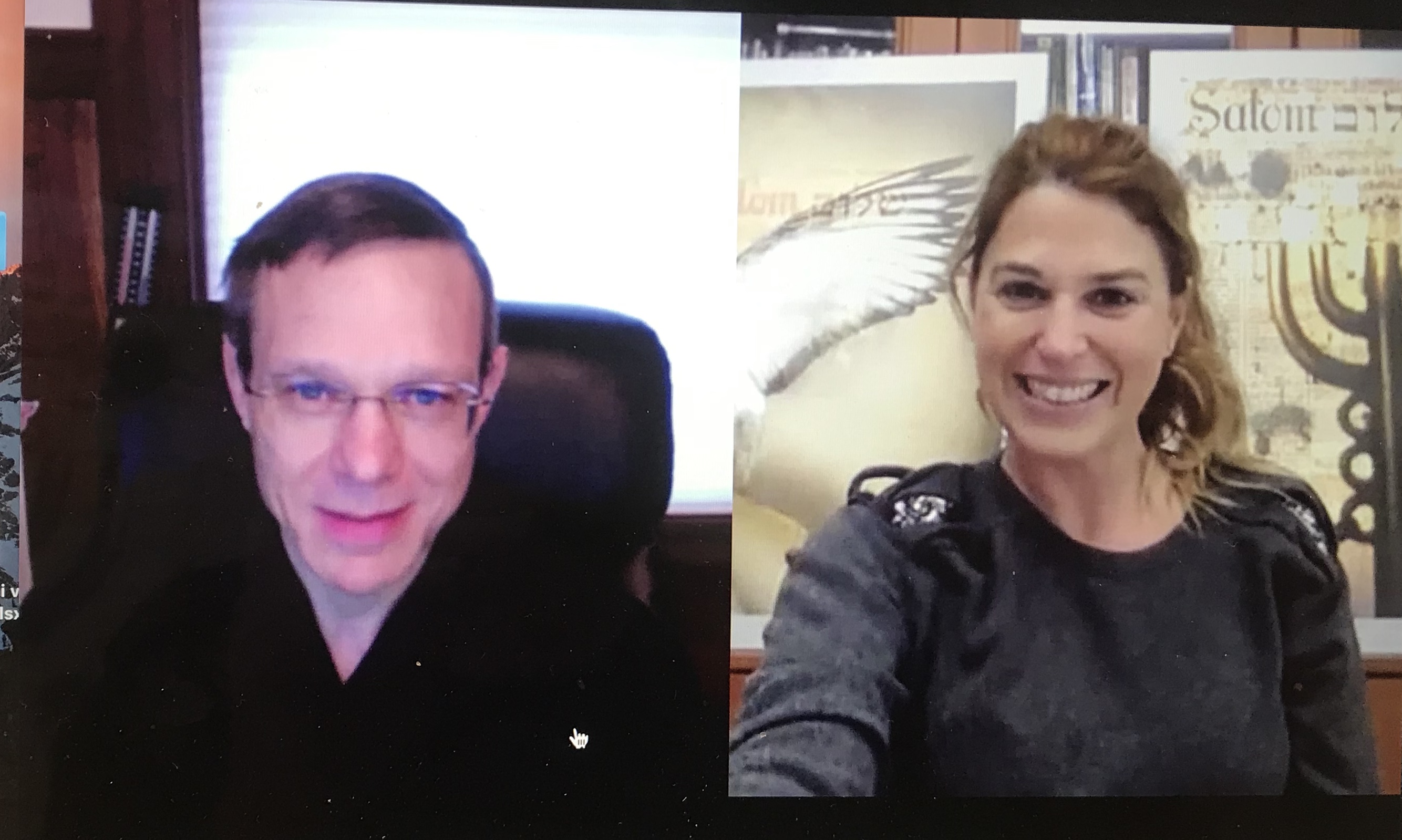
A snapshot from our Skype interview with Prof. Loeb
Could you please tell us about your early years in Israel and your days in the Israel army’s special Talpiod Program?
I was born in a small village near Tel Aviv. I used to collect eggs every afternoon, drive the tractor to the hills and read philosophy books. When I was drafted to the military I had to choose between running in the fields or doing intellectual work. Talpiod program recruited 20-30 people every year out of the thousands and there were many extensive exams. I was accepted. In first three years of that program we parachuted, we drove tanks, we ran in the fields and got a sense of what it’s like to be a soldier. But during that time, we also did our bachelor’s degree in physics and mathematics. After that, we did five years of research and development for the defense of Israel. I also insisted on doing scientific work and I was the first to finish my PhD. I was good at military duties too. I ended up being the leading theorist of a project that was funded by the Strategic Defense Initiative of the United States. We were accelerating masses to high speeds using electrical energy as propellant. We have a patent on that. Then it became a whole new department in the army. I used to visit Washington routinely. During one of the visits I was recommended to visit also Princeton University where Albert Einstein studied. I approached the administrator there, sent her my resume and 11 papers I wrote just before I finished my PhD. Then she called me and said there was only one person who could talk to me and that was Freeman Dyson (known by his famous Dyson Sphere). He directed me to another professor whose wife was Israeli, and they offered me a 5-year fellowship. After that I was offered junior faculty member at Harvard where there is little chance of getting a tenure. But three years later I was promoted to tenure.
Who influenced you to become an astrophysicist?
I was very interested in philosophy, I was not into astronomy very much at the young age but circumstances brought me to astrophysics because the position at Princeton was offered under the condition that I study astrophysics. It was like an arranged marriage then I realized I married to my true love. I discovered that astrophysics has a lot of philosophical questions in it. I always worked on things other people were not working on because I was never part of the main stream. When I studied the early stars, like scientific version of the Genesis from the Bible, nobody worked on that. Now it’s one of the major frontiers.
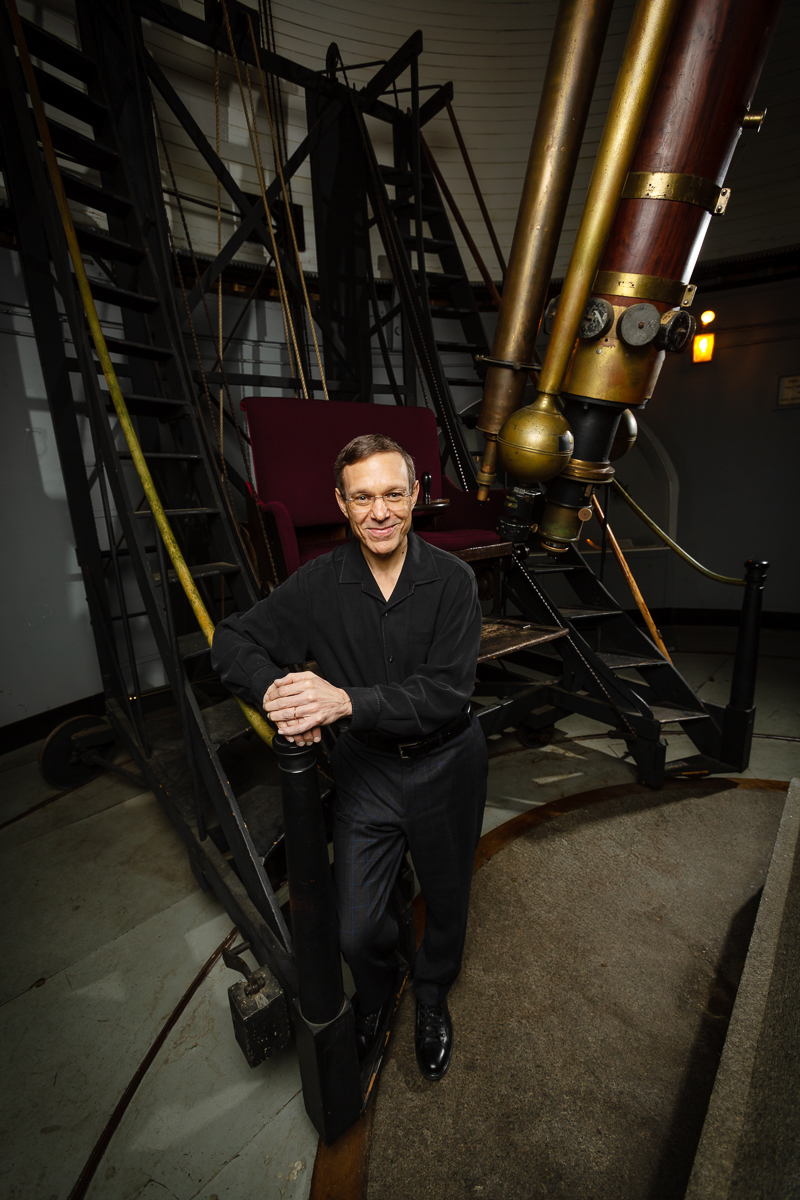
Has your religion played any role in your studies or in shaping your character?
In terms of shaping the way I think, yes. I grew up Jewish and I am very proud of my Jewish heritage. I am a proud Israeli, too. I am trying to represent the best aspects of that identity. As a child I studied the Bible which is obligatory in Israel. I read a lot of Jewish literature and Jewish philosophy as well. There is a lot of wisdom in the Jewish writings. In one my essays in Scientific American, I talked about taking the path that nobody takes. I quoted the Rabbi Nachman of Breslov: “The entire world is nothing but a narrow bridge and the main thing is not to be fearful at all- “Kol Ha'olam kulo Gesher Tsar me'od” That’s the motto of my approach. I realize the risk that I am taking. These are all calculated risks. I am not foolish. I am taking these risks because I think it’s important for the progress of science.
Is search for extraterrestrial intelligence your favorite science topic among your studies; for example black holes, early galaxies and ending of the universe?
I would say so because we can connect to life much more than to dead objects like stars or black holes. Obviously if we discover life away from Earth, there would be a huge impact in our society. And we would change our perspective about our place in the universe. I am currently writing a textbook - actually a first - on extraterrestrial life combining the search for primitive life (microbial life) and intelligent life. A lot has happened since the 1966 book ‘Intelligent Life on the Universe” by Carl Sagan and S. Shklovsky. And again, it is not a popular book but a textbook. As a result of all the publicity on Oumuamua I am writing a popular level book as well.
What is your answer to Fermi paradox - Where is everybody-?
My favorite answer is that probably the civilizations are short lived. As soon as they develop the technologies that allow us to see them, they also developed the means for their own destruction. We ourselves develop nuclear weapons, we are changing the climate in a nonreversible way. It is quite conceivable if we are not careful enough that our civilization lives for a few centuries and later destroy itself. If that’s the case for technological civilizations then that would explain why very few of them are alive at the same time as we are. This lifetime is much less than the age of universe. But that doesn’t mean we cannot find evidence for them because it’s just like in archeology, when we dig into the ground, we find evidence for ancient civilizations that are not alive anymore. So, we can dig into space and search for dead civilizations. This can be in the form of burnt up surfaces on planets or finding polluted atmosphere or finding artifacts - things that they built or equipment - just like we sent Voyager 1 and Voyager 2.
About Oumuamua
You wrote this article because there were strange facts about Oumuamua. First of all, what does its brightness tell us?
Oumuamua was discovered on the 19th of October 2017. Between 25th and the 30th of October we monitored it. We detected sunlight reflected from the object. We cannot image the object itself. The brightness of the object varies by a factor of 10 as it spins around itself and tumbles. A sphere would always reflect the same amount of sunlight. Since it is not the case that means that the shape is very extreme. It's length is at least 10 times bigger than its width. There could be two shapes that you can think of: either a cigar or a pancake. Considering it received a lot of kicks along the way and to interpret the brightness as a function of time, the most likely shape is a pancake. If its reflectivity is like a mirror - 100% - it should be 20 meters in size. If it’s reflecting only 10 percent of the sunlight it should be 200 meters in length. So, its somewhere in between that.
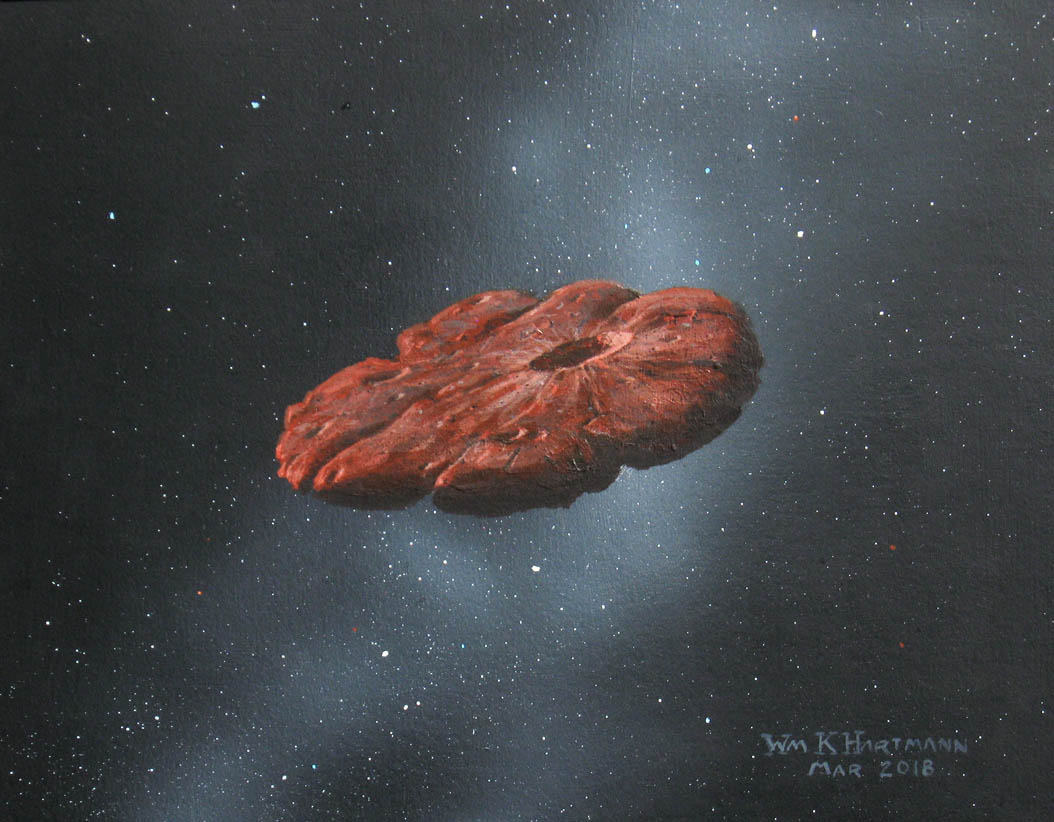
What about its trajectory?
The trajectory is not following what you expect. There is a deviation from an orbit that would be shaped by the gravitational force of the Sun. The most natural way to do that is if you have a comet, where a gas evaporates from the surface of the comet. You have ice that gets heated by sunlight, that would push the comet. Nevertheless we don’t see any cometary tail around this object. So, what is giving the extra push? What we suggested is that it’s the sunlight reflecting off the object. In order for that to be effective, the object needs to be extremely thin. 1 mm thin. So, we suggested maybe it is a light sail. The idea for light sail is just like a sail boat where the wind is pushing on the sail. Here, light bouncing off the sail is pushing on it.
Any other anomalies about Oumuamua?
A decade ago I wrote a paper forecasting how many such objects we should see and we predicted that we should not see any with PanSTARRS telescope. So, this is much more abundant then we expected. Each star in the Milky Way needstoeject 10^15 such objects during its lifetime to account for a population as large as Oumuamua implies. Thus, the nurseries of Oumuamua-like objects must be different from what we know based on our own Solar System.
The other thing is, it came from a very special frame of reference. If you take all the stars in the vicinity of the Sun, they move relative to each other but you can average over their motions and that is called a local standard of rest. This object was at rest in that frame but only one in 500 stars is at rest in that frame. You would expect that most rocks would move roughly at the speed of the star they came from. That star which the object is coming from would have to be very special.
My point is we should have an alert and look for other objects and figure out its origins. It could be artificial. The possibility is on the table.
There are many plausible natural explanations for Oumuamua like rocks that are so common that act as seeds to form planets or a comet that lost its tail through the energy of cosmic ray impacts thus preventing it to grow a tail. Why would you insist on a light sail rather than those?
In science you want to get as much evidence as possible. If someone gave me a photo of this object, that would be fantastic, then we would not need to speculate what it might be.
Let’s start with the rock hypotheses: It must be a very unusual rock because it is at least 10 times longer than it is wide, and that is a least a factor of a few more extreme in shape than any rock that we have seen in the Solar System. This is the very first object that comes outside of our system so it should be typical, whereas it’s not.
The amount of mass, the fraction of the object that needs to evaporate is at least ten percent in order to give it enough push. That’s a lot. You are talking about evaporating a big fraction of the object. Nevertheless, we don’t see any evidence for that. In ordinary comets we often see the tail. This object passed five times closer to the sun than the Earth is. It got to a temperature of 500 degrees, so it was very hot. How do you hide a cometary tail under these conditions?
About criticism
You are extraordinarily confident about your suggestion about Oumuamua being a technological artifact from an alien civilization. Could being a project leader in STAR SHOT Initiatives effect your judgement of Oumuamua?
Let me first explain the technology we are developing. We use a very powerful laser to push on a sail such that it weighs 1 gram and has a camera plus a navigation and communication device. In principle we can accelerate it to a fraction of the speed of light so that it reaches the nearest star which is 4 light year away in 20 years. So yes, that gave me the inspiration. In general, our imagination is limited to what we know and what we see. So, in this case my imagination was indeed expanded thanks to my experience with the Star Shot.
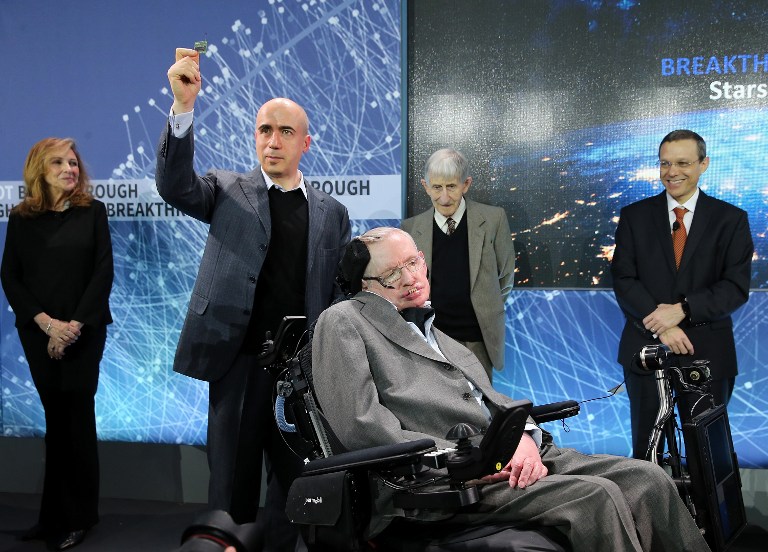
Yuri Milner, Stephen Hawking, Freeman Dyson and Avi Loeb
Your colleagues criticized you of coming up with a flimsy theory and insulting honest scientific inquiry. In face of these attacks you are telling them they should acknowledge and embrace uncertainty. What do you mean by that?
The attacks are coming from scientists that are not prominent. If you operate by saying the future is always like the past and are not openminded to something unexpected then you will never discover anything new. If you are too conservative you postpone the progress of science. It is unhealthy. Having a prejudice is really a problem. We should be open minded.
How come you are willing to risk your image, is that because you can always go back to the farm?
That’s funny because I was in Israel two months ago. There was an Israeli Tv crew following me, they asked me to visit the farm I grew up. The farm has a new owner. But I can see myself in that place again. I don’t think I’ve changed much. I am sort of like a museum item, I preserve my innocence, I am straightforward. When I was appointed a chair of the Astronomy Department at Harvard, my wife told me I would not survive a day because I am not very political, I am not manipulating people. Somehow, I am the longest serving department chair in history of astronomy department.
I don’t care so much about my image, I care about the truth. When I spoke to respectable scientists, they told me offline that they don’t understand this peculiar object. But they didn’t want to put their reputation on the line and risk their image. Tenure in universities is supposed to give you freedom without worrying about your job. But on the contrary they become more conservative.
Why do you think people are resistant to your idea?
I wrote an article in Nature about dark matter speculating it could be electrically charged and responsible for cooling the early universe. The response was just fine. The paper bothered nobody. I wrote the article on Oumuamua with the same spirit. Also, another example, in String Theory people are talking about extra dimensions. We have never seen any evidence for that and these people are getting awards and they are arrogant enough to claim that they carrying forward physics. To me the possibility of extraterrestrial civilizations is actually not a speculation because we know that a quarter of all the stars have a planet similar to the Earth. There are tens of billions of stars in the Milky Way, it is quite likely we are not alone.
People are resistant to anything unusual, anything different from the past. The second baggage to that subject is science fiction and reports on UFO’s which are not substantiated. This should not distort the scientific agenda. Science cannot be dictated by nonsense. The existence of civilizations out there has nothing to do with what people say here on Earth or what is popular on Twitter. Same thing happened with Gallileo. He said the Earth was moving around the Sun and the church put him in house arrest. That didn’t change the fact the Earth was rotating around the Sun. Who cares what people say? Science fiction books are not relevant to what is up there in the sky. Scientists should not be affected by popular culture.
How does the media respond to Oumuamua?
The response was huge. I communicated with the media because I thought it as a platform to show how the science is done. Most of the time we have uncertainty, we are not sure. And with Oumuamua it’s the same. We didn’t have enough evidence. All I did was to propose perhaps it is of artificial origin and to put that possibility on the table. And that was enough to get so much attention. It wasn’t my intention. We only wrote a scientific paper where we pointed out the anomalies of Oumuamua.
More than 50 radio stations contacted me, and tens of TV interviews were offered. Seven producers of documentaries wanted to speak to me as well. I declined most of them. By chance I visited Israel in December, and a reporter from Haaretz asked me for an interview about astrophysics in the next decade. I told him about Oumuamua, and he decided to change the topic. It appeared in the weekend edition of Haaretz, it became the most read story in the history of the newspaper. Three literary agents wanted me to consider writing a book, one agent persuaded me so I started writing the popular book on Oumuamua.
There are film companies interested in making a movie about you and your claim. Would you be interested?
No, I am just too busy.
Just like Nobel Prize winner physicist Kip Thorne helped Christopher Nolan to make his movie ‘Interstellar’. If anyone wanted to make a movie about Oumuamua could they consult you?
Yes. I have directors approached me in the past. But I don’t enjoy science fiction so much because many times it violates the laws of physics. I can’t enjoy a movie if its scientifically wrong.
About what next
Once our Large Synoptic Survey Telescope starts working in 2022 what do you expect to see?
The LSST is much more sensitive than the PanSTARRS telescope in Hawaii. If Oumuamua was one member of a population of objects that have random trajectories, we expect to find such object every month. If it doesn’t find anything within a year then we know Oumuamua is even weirder, almost unique. But if we find them every month, we can study these objects and proceed in science. We also wrote a paper with an undergraduate student at Harvard, Amir Siraj, on how similar objects like Oumuamua may be trapped in our Solar System just like in a fishing net by the gravity of Jupiter. We already identified 8 similar objects that may have been trapped. We can send a mission to fly by these objects and take photographs.
You said: “Knowing that we’re not alone would make us feel part of planet Earth as a civilization rather than individual countries voting on Brexit. What would the implications of that discovery be if that ever happens?
That would be tremendous. The most important question to ask is are we the smartest kid on the block? It’s like showing a caveman an iPhone.The caveperson would say it was a nice rock. The caveperson is used to rocks. So now imagine this object—‘Oumuamua—being the iPhone and us being the cave people. We look at it and say it’s a rock. So first of all, we can learn from them. We will have to learn how to communicate with them, that is ‘astro-linguistics’ or how to deal with them, ‘astro-economics’. Any subject that is currently studied you add the word ‘astro’ to it. There would be an effect on religion because you will have to understand our place, it’s like finding you have a sibling and you are not so special anymore. The other thing is that if we find evidence of a dead civilization it could teach us a lesson about how to behave so we don’t share the same fate.
Stephen Hawking warned us about contacting aliens, do you agree with him?
The smartest thing to do is be quiet first and listen then get as much information as possible and decide what to do. If you look at what happened in South America, the Mayan culture was destroyed all together by the Spanish.
Anything you want to add Prof. Loeb?
I was in Jerusalem a week ago attending a conference that included theologians, philosophers and physicists. Suppose we create a synthetic life in the lab, suppose we are able to produce a baby universe, would we then have the privilege of calling ourselves God in a way? Because these are the two pillars that appear in the story of Genesis. Maybe another civilization a million year more advanced than us may be able to achieve that. At Harvard there is an experimental team trying to produce synthetic life in the lab and there are papers in the literature talking about creating a universe in the lab just based on how the universe started with a cosmic inflation. They are creating the similar conditions. So maybe we exist as a result of a more advanced technology that created us. The Bible says God created this and that, it might be the case an advanced technological civilization created this and that.
Who is your favorite philosopher?
Jean Paul Sartre since my childhood days. He was not a very methodical philosopher and basically, he described the human experience the way it is without pretending itself to be anything else than it actually is. Being authentic attracted me. You can summarize everything we talked about today as my attempt to be as authentic as possible, not to put any make up, just the way I am.
Maybe you will be remembered as a philosopher as much as a scientist.
I don’t care what label people put on me. I care about learning about the world and the most exciting thing would be if we find life.
Related Newsss ss










